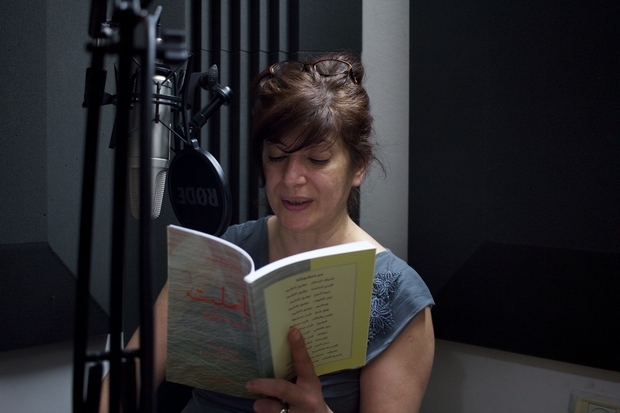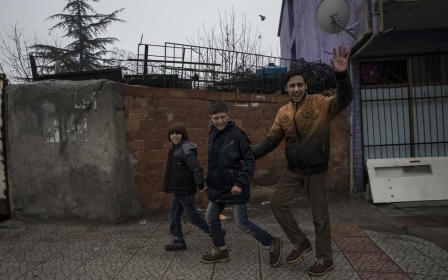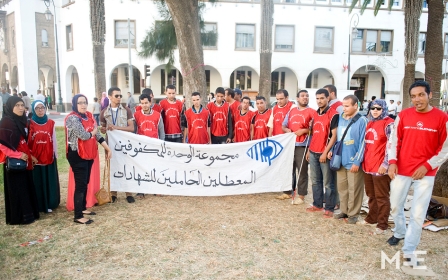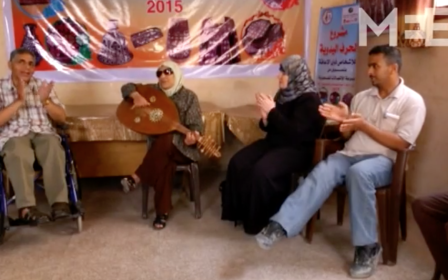A beacon of hope from the blind optimist of Nazareth

NAZARETH, Israel - A few minutes’ walk from the Basilica of the Annunciation in Nazareth, Abbass Abbass is working on ambitious new projects in his association’s headquarters.
Seated at a small desk with a plate of baklava, the founder and chief of the al-Manarah (Lighthouse) charity asks for a coffee and starts talking enthusiastically about his latest plans.
The 39-year-old has suffered from a degenerative sight condition since childhood, and can only identify people through their voices. However, although his eyes are barely functioning, they still light up with excitement when he relates his organisation's goals.
“I come from a Palestinian family of refugees who were forced into exile from their village in 1948 and stripped of their most basic rights. Being Arab adds a layer of discrimination on top of the realities of living with my handicap,” he said.
But Abbas sees the twin challenge of being blind and Arab as also offering a dual opportunity.
“I have put up with so much humiliation, that the strength has grown within me to make things change on both sides. I want to encourage Jewish people to understand Arabs more, and encourage Arabs to have more compassion towards disabled people.”
Lighthouse, known as the Association for Persons with Disabilities, was formed 2005 to serve as a beacon of information about disability rights and a source of empowerment for the disabled community.
In an audio room next door, silence is demanded: Shakespeare’s Hamlet is being recorded in Arabic by two members of the association. Elizabeth Nassar is reading, while Laren Sakhnini is mixing and arranging the sound.
Built six years ago by volunteers, the recording studio is a precious resource. Around 40 new audio books are being added to an online library each month in what has become a well-oiled machine. A children's book takes just 20-30 minutes to be recorded, while a novel can take a few days.
A similar programme has already been set up in the West Bank by the University of Birzeit, sponsored by UNESCO, with the audio books produced there broadcast in classrooms or on Palestinian radio. But Abbass has bigger aspirations: the association has created an app for the visually impaired that can be used by Arabic speakers throughout the world to access the group's vast and growing online library.
According to the association, there are already more than 3,000 references available online through its website. The majority are in Arabic, but some of the books are in Hebrew or in English. The range features everything from books about personal development, to fairy tales and adventure novels. They also have classics of French literature such as The Fables of Jean de la Fontaine.
Animated short-films will soon be added to the online library and the audio-descriptions of those shorts will be written by students from two schools in the region of Nazareth, one Arab school and one Jewish school.
In order to have access to the library, prospective members must provide a doctor’s note to prove their disability. According to the latest activity report from the association, more than 10,000 visually impaired or blind individuals have already accessed the website. Last September, the famous Israeli author Amos Oz came to the studios to record extracts of his latest book, Judas.
‘Society treats us like less than nothing'
The Lighthouse aims to improve how disabled people in general are perceived by Arab society. Abbass founded it in the wake of being rejected at a job interview. “Despite my two master degrees from the Hebrew University of Jerusalem, the recruiter didn’t see beyond my handicap. I felt totally disrespected, looked down upon. Society is treating us like less than nothing. I’m fighting against that.”
One main focus of the association's work is organising workshops to raise awareness in Arabic schools. Across the country, from the Golan to the Negev desert, around 30 Israeli schools benefit from this programme. Seven blind people, paid by the association, teach students what equality and dignity means, also encouraging them reflect on how important it is to use the correct words when talking about disability.
“If you call me disabled, my whole identity is summarised in my handicap,” says Abbass. “If you say I have a handicap, it changes everything: You see me first as a human being. My handicap only comes second.”
The workshops also nurture students’ empathy towards classmates who have a handicap. One of these activities consists of finding their way through a classroom blindfolded, using a walking-stick; an exercise that brings back painful memories for Abbass. “I was the only blind kid in my school. I was bullied, mocked, tripped up.”
Despite all of this, Abbass still insists he was lucky. His parents - his father is a lawyer and his mother a housewife - always supported him. This is not the case in every Arab household, according to him.
“In Arab society, parents of children who have a handicap view it as a burden. They are ashamed, therefore they cannot really help children reach their full potential. It is even harder for girls. They have zero chance of finding a husband. No one believes they’d be able to raise a family.”
Families are not equipped to act on their own, says Abbass. There are about 7,000 blind Palestinians with Israeli citizenship. Their lives are like a real-life obstacle course, says Abbass. And not only when they are walking on the smashed-up pavements of Nazareth, the biggest Palestinian city in Israel, completely overlooked by the Israeli authorities.
“There’s a huge difference between public services in Jewish cities and in Arab ones. For instance, Nazareth has been allocated a budget that is three times smaller than the one allocated to Nazareth Illit, the next city; this, despite having a population twice as big. There are consequences on the budget allocated to care for disabled people. Jewish associations receive more funding than we do, and it is difficult to rally political leaders on that matter. They don’t take us seriously, they patronise us and think that we are unable to take control of our lives.”
Parallel to the other social programmes offered by the association such as lessons for adults and legal advice, Abbass is constantly looking for new readers who could help enrich the association’s virtual library.
“We now have readers from Gaza, Egypt and Libya who record for us. An Algerian and Jordanian would like to join the adventure too. I would like to create a model of crowd-reading, based on the crowd-funding model. Al-Manarah is a heart, and readers from around the globe are the veins.”
This article was originally published on Middle East Eye's French website and translated by Nassima Demiche.
New MEE newsletter: Jerusalem Dispatch
Sign up to get the latest insights and analysis on Israel-Palestine, alongside Turkey Unpacked and other MEE newsletters
Middle East Eye delivers independent and unrivalled coverage and analysis of the Middle East, North Africa and beyond. To learn more about republishing this content and the associated fees, please fill out this form. More about MEE can be found here.





